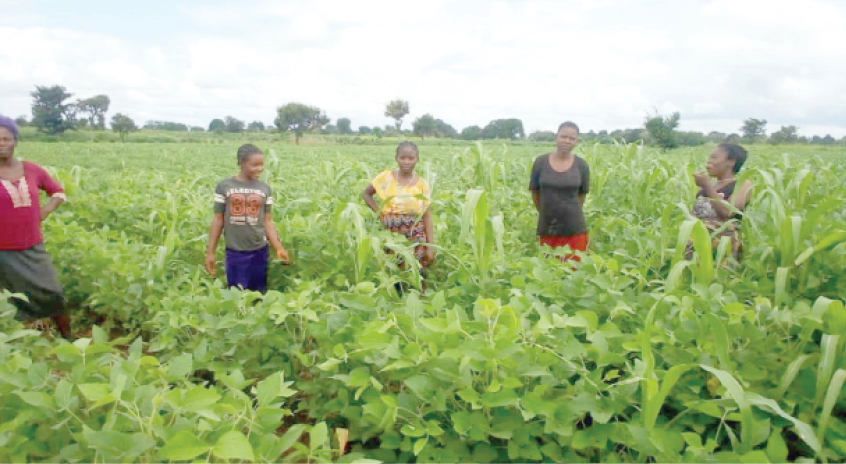Women in Benue State have taken the lead in soybean farming, breaking the historical male-dominated tradition.
Soybean farming is, therefore, no longer an exclusive club for men in Benue as women are now actively engaged in soybean cultivation for both sustenance and income generation.
Our correspondent reports that some of these female farmers are daily overcoming challenges and telling their success stories in an effort to close gender gap among soybean producers in the state and Nigeria as a whole.
Tabitha Nder, one of such female soybean farmer in Apine-Mbayion community of Gboko Local Government Area of the state, expressed optimism about expanding her farm in order to make more income.
A romance, a birthplace: Destroyed memories of Gaza’s bombed Ahli Hospital
67th birthday: Kwankwaso donates building, mosque in father’s memory
She explained that due to the inaccessibility of high yielding seeds in the past, not much was realised from her soybean farming, especially as access to land for farming was limited to the female gender.
But having learnt best agronomy practice from some agricultural experts, she hadn’t only boosted yields in the past two years, her soybean production got better in the recent season for consumption, as well as income generation.
Nder, however, expects a bountiful harvest from her soybean field in the few next weeks.
“Soybean farming is very lucrative but the biggest challenge is fertiliser. It is better this year than previous years. I do it for commercial and consumption purposes. I prefer soybean farming to any other; I don’t even do rice. I restricted my farming to only soybeans and yam,” she said.
Another female farmer changing the narrative of soybean farming in the ‘Food Basket’ state, Queen Abur, disclosed that she was doing very well in soybean production for both commercial and consumption purposes.
Although she worries about the manual method of soybean production in her locality, which according to her poses a huge challenge, in her estimation the government needs to contribute its quota by providing needed machines to make the process easier.
She further opined that the greatest challenge soybean farmers faced in the past was the unavailability of fertiliser, quality seeds and insect attack, which had been taken care of by some agricultural experts, except for the post harvest handling as there were not enough reapers, so harvesting was mostly done manually.
Interesting, she said there were no problems with marketing the produce, emphasising, “I don’t have problem with market, right in my house or farm at Gboko, they come to buy it.”
In the same vein, Ngunan Tarnguhwar, a female ex-banker resident in Makurdi, who found fortune in soybean farming, noted with delight that she ventured into the space over five years ago, and since then, have been doing it for commercial and consumption purposes.
“My motivation came after I lost my banking job and the only thing I found satisfying was farm work. So I ventured into soybean farming, and then, while I was growing up, my parents used to farm soybeans. Apart from general economic hardship we are facing now, I am believing God for quite a huge yield this season,” Tarnguhwar said.
Apart from these women, there are many others engaging their various fields for commercial soybean production and income generation.
The state chairman of Soybean Farmers Association, China Peters, corroborated the narrative that the women are doing exploits in soybean farming in the state, pointing out that the crop has assumed a gold status in the state.
Peters said, “Out of the 18,000 registered farmers under the soybean association in Benue, about 5,000 are female farmers. They are doing very well in their commercial farming and cooperatives. And since we are into farming as a business, I will like to encourage them to strive harder so that together we will promote soybean production in Benue and Nigeria.
“As we speak, the soybeans is gold. I want everybody in the association, including all the women to become an importer of soybeans so that we can earn in dollars. That is what we are working towards.”
NaterIyorkaa, a principal investigator from the Department of Plant Breeding and Seed Science in College of Agronomy at the Joseph Sarwuan Tarka University, Makurdi (JOSTUM), formally known as Federal University of Agriculture, Makurdi (FUAM), have over the years educated the women at community level about best agronomy practices.
He expressed satisfaction over their remarkable successes, saying that before now, the women who have been into soybean farming but were not making much profit could now enjoy impressive harvest occasioned by access to quality seeds.
Iyorkaa explained, “They (women) have been into soybean business for a long time but have not been making much gain. They produce and also aggregate from other producers within their community to supply to bigger off-takers. I met with them during training with the Tree Crops Federation at Yandev in 2021.
“In the course of interacting with them I realised that they were facing a lot of challenges in their soybean business, such as lack of improved seeds, improved agronomic practices and inappropriate post harvest handling. I, therefore, organised special trainings for them through the Seed Equal Project, being a soybean seed systems project funded by International Institute of Tropical Agriculture (IITA) and implemented by JOSTUM, which I am the principal investigator.
“I also gave them improved seeds and inputs to manage the farm. They were over excited to see their soybean farms doing better than what they used to have. They are making efforts to farm more next cropping season since they now have improved variety and also know the improved agronomic practices. They are expecting to harvest above 2 tonnes per hecter against 0.5 they have been harvesting in the previous years.”
Our correspondent reports that for Benue female farmers, the importance of soybean in generating household income cannot be overlooked, much as its nutritive and economic importance for diverse domestic usage has made it a dependable crop.
Over the years, experts such as Iyorkaa believe that the crop has become more popular in Benue because consumers use it for food – soy-milk, soy-cheese, cake, infant weaning food, just as it is an excellent heart friendly vegetable oil.
Experts posited that besides soybean usage in industry, the crop improves soil fertility and controls the parasitic weed, striga harmonica, even as the derivatives are used for livestock feed, especially for poultry, among others.
Prof Lucky Omoigui, a plant breeder in the College of Agronomy, in a previous interview with our correspondent in Makurdi, maintained that the benefit of the edible crop could not be quantified.
He referred to soybean as the ‘miracle’ crop in the state.
Omoigui said that over the years, soybean production had expanded because of the rapid growth in the industrial sector that requires soybean, adding that soybean is a major cash crop and widely used in the food and feed industry.
For the success stories of the female farmers, the experts had explained that in the area where rainfall cannot sustain long duration soybean varieties, there were the need for early maturing varieties and as such farmers have to be introduced to high yielding varieties.
The experts explained that before now, farmers were used to old varieties that had been developed for more 22 years, which if terminal drought sets in, it often leads to poor harvest as most of the old varieties have a long maturity period.
Omoigui had therefore posited that soybean production should not be on expansion on land area alone but on productivity per unit area, as he disclosed that based on his record from on-farm evaluation of soybean in four local government areas of Benue State, most of the new varieties introduced by the university and produce on average at farmers field was 2.5 tons/ha.
“We have to identify and recommend suitable soybean varieties that have good adaptation and high yield in a particular ecological zone rather than recommending one variety across all ecological zones,” the plant breeder had said.

 Join Daily Trust WhatsApp Community For Quick Access To News and Happenings Around You.
Join Daily Trust WhatsApp Community For Quick Access To News and Happenings Around You.


